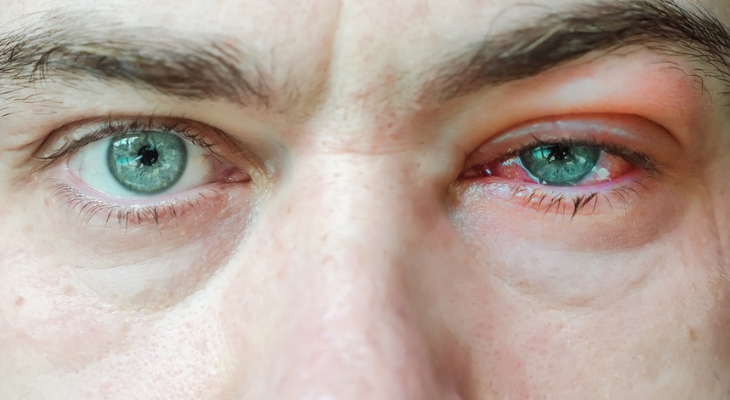
Dry Eyes? Blepharitis Could Be to Blame
Wondering why your eyes are red, dry, and itchy? A condition called blepharitis could be the reason.
What Is Blepharitis?
Blepharitis occurs when your eyelids become inflamed and irritated. The inflammation can be due to:
- Bacteria on Your Eyelids
- Clogged Oil Glands at the Base of Your Eyelashes
- Overgrowth of Tiny Mites That Live in Eyelash Follicles
- Allergies
- Skin Conditions, Like Rosacea, Psoriasis, and Dandruff
According to an article published in the February 12, 2021 issue of Review of Ophthalmology, blepharitis can also change the quality of the oil made by your eyelids. Natural oils keep your tear film healthy and your eyes moist and comfortable. If the oil you produce isn't high quality, you may soon experience dry eye.
How Can I Tell if I Have Blepharitis?
In addition to dryness, signs and symptoms of blepharitis include:
- Stinging, Burning, Itchy, or Watery Eyes
- Foreign Body Sensation
- Eyelid or Eye Swelling
- Light Sensitivity
- Crusts on Eyelids First Thing in the Morning
- Bubbles in Your Tears
- Dandruff-Like Flakes on Your Eyelashes
- Eyelashes That Fall Out Easily or Don't Grow Normally
According to the National Eye Institute, untreated blepharitis can increase your risk of developing chronic red eye, damaged corneas, or bumps (styes and chalazions) on your eyelids caused by blocked oil glands.
What Should I Do if I Think I Have Blepharitis?
A visit to your optometrist is the best place to start if you're suffering from dry eye. Your eye doctor can determine if your symptoms are caused by blepharitis or another condition. He or she can also discuss treatment and management options, which may include:
- Cleaning Your Eyelids. Can you remember the last time you cleaned your eyelids? Most people don't devote any time to their eyelashes when washing their faces. If you have blepharitis, a daily eyelid cleaning can help keep your condition under control. Clean your lids with baby shampoo diluted in water or eyelid cleanser or wipes. Use gentle pressure with a washcloth or wipe to remove debris and bacteria.
- Using Compresses. Warm compresses soften blocked oil glands and loosen crusts and flakes. Use a moistened washcloth or an eyemask that can be heated in the microwave.
- Improving Your Skincare Routine. Bacteria or oil on your face, hair, and scalp can cause or worsen your symptoms. Washing these parts of your body regularly may help ease your blepharitis and dry eye symptoms. If you have dandruff, keep flakes under control with a dandruff shampoo.
- Drugstore or Prescription Drops. Liquid tears or lubricating eye drops will ease dry eye symptoms. A steroid eye drop might be helpful if your eyes are red and swollen.
- Choosing Makeup Carefully. Some types of makeup can irritate your eyelids and cause blepharitis. Stay away from products that contain parabens, wax, and fragrances. Throw away any makeup used before you were diagnosed with blepharitis, as it may be contaminated with bacteria. Avoid makeup products that irritate your eyelids, even if the product is labeled hypoallergenic.
- Taking Antibiotics. If an overgrowth of bacteria is responsible for blepharitis, your eye doctor may prescribe antibiotic eyedrops or ointment. In some cases, oral antibiotics may be recommended.
- Getting Rid of Mites. If mites are responsible for your condition, your eye doctor may recommend scrubs or gels designed to kill the parasites. In some cases, an oral medication that kills the mites may be the best option. You may need to use the products or medication for several weeks to ensure that all of the mites have been killed.
- Increasing Omega-3 Fatty Acid Intake. Taking fish oil supplements or eating foods high in Omega-3 fatty acids, like salmon, trout, mackerel, herring, flaxseed, and soybeans, could have a beneficial effect on dry eye symptoms and blepharitis.
- Trying Cyclosporine. These prescription eyedrops reduce inflammation and help your eyes produce more tears.
- Treating Underlying Conditions: Keeping rosacea, dandruff, psoriasis, or allergies under control may help reduce your blepharitis symptoms.
Do you think your dry eyes might be caused by blepharitis? Give us a call and we'll schedule your visit with the eye doctor.
Sources:
American Academy of Ophthalmology: What Is Blepharitis?, 8/8/2022
National Eye Institute: Blepharitis, 8/31/2020
Review of Ophthalmology: Dry Eye: The Blepharitis Connection, 2/12/2021




